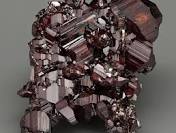
Rutile is a mineral that majorly consists of titanium dioxide (TiO2). This mineral is found in metamorphic, sedimentary, and igneous rocks worldwide. It occurs in various colors such as yellow, black, transparent, golden, opaque material, and reddish depending upon its sources. It has a structure like a tetragonal crystal having two four-sided prisms.
It can be obtained in both natural and synthetic ways. Natural rutile has huge availability globally while synthetic rutile can be contrived from ilmenite which is a mineral type used in titanium and titanium dioxide production. The chloride process and sulfate process are the major rutile processing methods widely used in the global environment. The sulfate process is majorly used for rutile processing over other methods. In this process, sulfuric acid is used to react with rutile which gives titanium with some unwanted substance as residue.
It is used in the production of titanium metal. Rutile is crushed into a white powder, which can be used as a pigment in paints for various applications.
Rutile Market size is forecast to reach $4.1 billion by 2025, after growing at a compound annual growth rate (CAGR) of four point eight percent (4.8%) during 2020-2025. Growing demand from different industries such as construction, automotive, packaging, and electronics for titanium oxide is anticipated to accelerate the market development.
Rutile is a crucial intermediate and is used in the manufacture of titanium dioxide which is commonly used in many industries. Also, rutile is commonly found as an inclusion with other minerals such as quartz and is present as needle or parallel fibers in the minerals. The asterism effect of gemstones is responsible for the use of rutile as the inclusion of several gem stones, including star sapphire. Hence, due to the rising demand of rutile from various end-user applications the rutile industry is expected to rise in the forecast period.
By Type:
Natural Rutile
Synthetic Rutile
By Process:
Chloride Process
Sulphate Process
By Application:
Titanium
Refractory Ceramic
Others.
By End Use:
Automotive Industry
Packaging Industry
Paints & Coatings Industry
Construction Industry
Electronics Industry
Others
Unlike some of the other natural resources and minerals in Nigeria and in other parts of Africa, Titanium deposit in Nigeria isn’t vast as it’s currently found only in Ekiti State.
Rutile which is a crucial raw material input for so many industries such as construction, automotive, electronic, packaging etc has been in the country's importation list for so many years, this has contributed in draining the nation's foreign exchange earnings.
A lot of mining activities are going on within and outside the country as new mining companies are opening up every day to tap into this lucrative sector. Based on the above rutile has a large, growing and sustainable market in Nigeria.






















